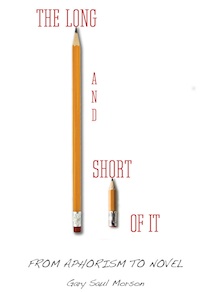By Lewis Fried
How do few words judge the enormity of experience? Morson proposes that we look at a “short genre” composed by the apothegm and the dictum. Bringing up Bakhtin’s idea that genres are “‘form-shaping ideologies,’“ Morson argues that they are “worldviews [sic] seeking expression,” and he deals with the short genre as such.
How can we read it? This book approaches the problem through literary classification, sensibility, and content. Aphorisms are termed apothegms, which address the perplexing nature of the world. As Morson puts it, “apothegms appeal to those who find the world to be fundamentally mysterious.” On the contrary, a dictum offers certainty. Again, Morson: the dictum “offers itself as the solution to a supremely important riddle that has long perplexed humanity.” This latter peels back the shroud enfolding experience.
In Morson’s schema, the short genre brachiates: for instances (and I do not cite all) into “Witticisms and Witlessisms,” (which, in turn, leads us to “The Resourcefulness of Wit” and “Stupidity Shines”) to “Two Kinds of Trial” (divided into “The Summons” and “The Thought”) to “Prosaic Apothegms.” Morson’s classifications and their contents are vivid, sampling the vastness of letters, from the ancient Greeks to Yogi Berra and beyond.
In a larger sense, Morson is giving us fundamental categories of expression that make a go of things, rhetorically and ideologically. Mapping our reliance on the short genre’s presentation of experience, we have an interesting situation standing in front of us. Whereas the makers of apothegm and dictum assent to their judgment of situations (whether offering certainty, undercutting it, or even pulling away the foundations of both ), it is yet another problem whether we agree with their pronouncements.
As a result, it is worth asking if the apothegm and dictum transfer their own doubt as well as certainty to the reader? Morson plunges into this thicket, offering us ways of reading within and amongst apothegm and dictum. After all, they depend on reader and speaker (or author) sharing or understanding the same world-view. The short genre also depends, if it is to be historically effective and affective, upon the continuity of human experience; confusions and clarities that strike us as such, must have also struck our ancestors (whether in the identical way, of course, is debatable).
What we have before us, therefore, are not simply two opposing approaches to experience. Rather, we are given a clothing and undressing of our rhetorical approaches to self and world. Can commentary illuminate our perplexities or seal them? Does the “short genre” encapsulate wonder, or does it dismiss the ineffability of experience? Does this genre offer us a wisdom, a human prudence that we extract from common experience, or confirm our limitations?
Scripture is a good-case example. Do we have to agree with the apothegms and maxims in it? Which impose themselves as responses to our ethical problems, such as the Torah being the “tree of life to those who take hold of it”? And, at the same time, can we prize biblical writers, in no particular order, from the Prophets to Koheleth to Job to Proverbs who tell us that there are things we cannot not know: God’s ways are not our ways. How do we hold such pronouncements in our minds without Socratic irony? Or, can we ignore their dialogue entirely, seeing them as short shrifting our engagement with the world?
Readers of this book will come away enriched. Whereas Morson’s categories may seem to be too neatly divided, they nonetheless illuminate the human—and rhetorical—issue at hand. It is the reader’s pleasure—it certainly was mine—to see Morson’s resourcefulness and grace of interpretation. This book, I think, will influence the way we look at expression and text.
Lewis Fried (ΦBK, Queen’s College, CUNY, 1964) is Professor of English Emeritus at Kent State University and a resident member of the Nu of Ohio chapter of Phi Beta Kappa.




